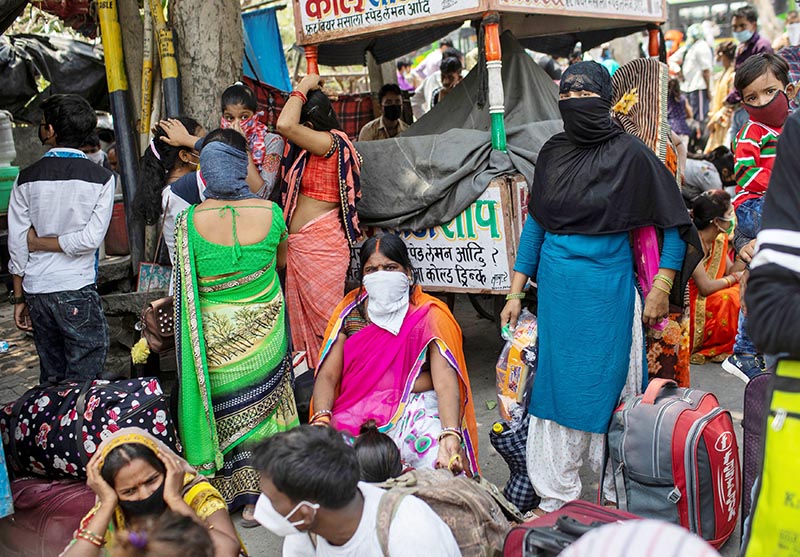Worldwide coronavirus cases over 4.71 million, death toll crosses 312,800
More than 4.71 million people have been reported to have been infected by the novel coronavirus globally and 312,826 have died, according to a Reuters tally.
Infections have been reported in more than 210 countries and territories since the first cases were identified in China in December 2019.
Summer weather is enticing much of the world to emerge from coronavirus lockdowns as centres of the outbreak from New York to Italy and Spain gradually lift restrictions that have kept millions indoors for months.
The World Health Organization referred to it as a pandemic on March 11, 2020.
DEATHS AND INFECTIONS
At least 1,449,755 cases of the highly contagious novel coronavirus have been reported in the United States and its territories, according to a Reuters tally of state and local government sources. The US diagnosed its first COVID-19 case in Washington state on January 20.
Likewise, Russia follows the US with a total of 281,752 coronavirus cases. According to Reuters’ interactive graphic tracking the global spread, the UK has the second-highest 34,636 deaths from the viral infection after the US.
EUROPE
‒ Greeks flocked to the seaside when more than 500 beaches reopened and thousands returned to church on Sunday after weeks of staying away as a ban on mass gatherings was eased.
‒ Spain's daily death toll fell below 100 for the first time in two months, the health ministry said on Sunday, as some parts of the country prepared for a further loosening of lockdown measures.
‒ Temporary unemployment schemes operating across Europe could struggle to save the jobs of leisure and travel sector workers facing drawn‒out or partial recoveries from the pandemic, even if they help industries that rebound quickly.
‒ The number of people who have died in the United Kingdom after testing positive for COVID‒19 rose by 170 to 34,636, business minister Alok Sharma said, the lowest increase in the official death toll since March 24.
AMERICAS
‒ The most important data for the US economy right now is the "medical metrics" around the pandemic, Federal Reserve Chairman Jerome Powell said in broadcast remarks where he outlined the likely need for three to six more months of government financial help for firms and families.
‒ US House Speaker Nancy Pelosi said there will be negotiations on the new $3 trillion coronavirus relief legislation passed by the Democratic‒controlled House of Representatives.
‒ Wearing a face mask, Brazilian President Jair Bolsonaro posed for photographs with children plucked out of a crowd of supporters, disregarding public health advice aimed at containing one of the world's worst virus outbreaks.
‒ Mexico on Sunday reported 49,219 cases of the coronavirus, 2,075 more than the previous day, as the country prepares to resume economic activities deemed essential.
‒ US authorities are not yet seeing spikes in coronavirus cases in places that are reopening, but it was still too early to determine such trends, health secretary Alex Azar said.
‒ Kevin Harvick and NASCAR both celebrated victories on Sunday as the stock car series returned to live racing from a two‒month hiatus at an empty Darlington Raceway.
ASIA‒PACIFIC
‒ India extended a nationwide lockdown to May 31, as cases exceeded 90,000 and further clashes erupted between police and stranded migrants.
‒ Thailand opened malls and department stores for the first time since March in its second phase of relaxing measures.
‒ Wearing masks and keeping about a metre apart, men and women in Wuhan were dancing once again on a Saturday night by the side of the Yangtze river, which winds through the central Chinese city where the pandemic began.
‒ Japanese hospital doctors on the front line of the pandemic face tough working conditions, with many reusing masks and few getting hazard pay, a survey by a labour union showed.
MIDDLE EAST AND AFRICA
‒ Egypt will bring forward the start of its curfew by four hours to 5 p.m. and halt public transport during the six‒day Eid holiday from May 24, the prime minister said.
‒ Zimbabwe will keep its lockdown for the time being, though businesses will be allowed to open for longer and the restrictions will be reviewed every two weeks, President Emmerson Mnangagwa said.
ECONOMIC FALLOUT
‒ Japan's economy slipped into recession for the first time in 4‒1/2 years, putting the nation on course for its deepest post‒war slump.
‒ China's new home prices rose at a slightly faster pace in April, adding to signs of gradual recovery in the property market as the government eases restrictions on movement.
‒ China has asked trading firms and food processors to boost inventories of grains and oilseeds as a possible second wave of coronavirus cases and worsening infection rates elsewhere raise concerns about global supply lines.
‒ Emirates Group is planning to cut about 30,000 jobs to reduce costs, which will bring down its number of employees by about 30% from more than 105,000 at the end of March, Bloomberg News reported.
‒ Global demand has slumped significantly due to the outbreak and trade faces unprecedented challenges, China's commerce minister said.
‒ Apple Inc will this week reopen more than 25 of its branded stores in the US continuing a gradual process that has unlocked doors at nearly a fifth of its worldwide retail outlets.






